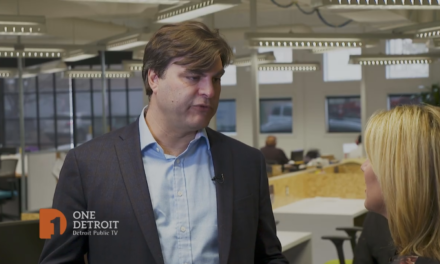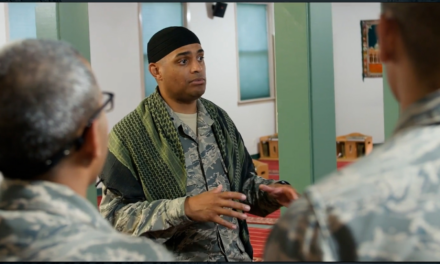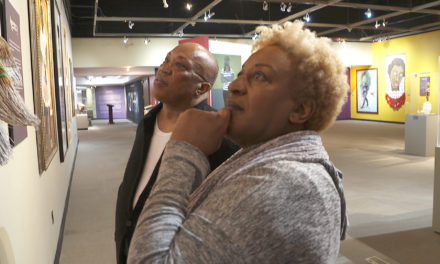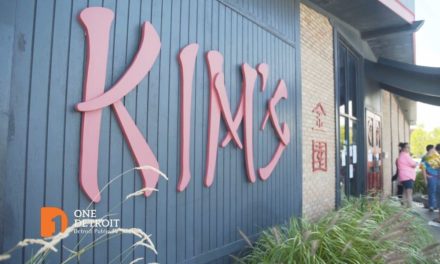A captivating new short film, “Detroit We Dey,” directed by Detroit filmmaker Ozi Uduma is set to make its digital premiere June 1 as part of PBS’s highly anticipated “Homegrown: Future Visions” film shorts series. The film’s title roughly translates to “Detroit we’re here,” Uduma said.
As part of an eight-film anthology presented by Firelight Media and the Center for Asian American Media (CAAM) to illuminate the Midwest experience, the documentary takes a compelling look at the history and future of a social club, called the Old Bende Association, founded by a community of Igbo-Nigerians who immigrated to Detroit in the 1970s and ‘80s.
Through reflective storytelling and vintage VHS tape footage, “Detroit We Dey” delves into the unique stories, experiences and cultural contributions of Detroit’s Nigerian community, but it also highlights the community’s resilience in immigrating to a new country and holding onto its cultural heritage.
Ahead of the film’s digital PBS release, One Detroit Senior Producer Bill Kubota sat down with Uduma to talk about her film and the history it chronicles. Plus, they talk about how the Nigerian diaspora has come to intersect with Detroit’s larger predominately Black community, how the rise of the internet and social media have helped open Detroit and the world up to Nigerian food, music and culture, the next generation of Nigerian Americans in the city and the importance of documenting the community’s history.
“Homegrown: Future Visions” is a co-production of Firelight Media and the Center for Asian American Media (CAAM) with funding provided by The Corporation for Public Broadcasting, in association with PBS.
Watch “Detroit We Dey” on demand now:
Full Transcript:
Bill Kubota, Senior Producer, One Detroit: ‘Detroit We Dey’ a short PBS film about the lives of Nigerians in Detroit, preserved in snapshots and on BHS tape.
Ozi Uduma, Director, “Detroit We Dey”: To the uninitiated, this is an extremely chaotic scene. But for me, this is what it means to be Nigerian in Detroit. The title is basically Nigerian English or Nigerian Pidgin, and it’s just essentially rough translation of Detroit we’re here. Of all the places my parents, aunties and uncles could have immigrated to, they chose Detroit. It was my way of fuzing both, one part the Nigerian community and also like the kind of throw to acknowledgment of Detroit, I should say. They came to a place that was the complete opposite of where they grew up. I’m really excited for the larger community to see the film because…
Bill Kubota: Detroiter Ozi Uduma directed ‘Detroit We Dey’.
Ozi Uduma: There has been a lot of like just pride and happiness around the existence of this film and some type of documentation of the history of the community.
Bill Kubota: The Nigerian Diaspora. Many emigrated to the United Kingdom in places across the U.S..
Ozi Uduma: Outside of Detroit. We have everywhere from Chicago to New York. Houston, Texas is the one that is like I would call the headquarters of the Nigerian diaspora. Atlanta, L.A. So we’re… Like the Nigerian diaspora is pretty big. But in terms of Detroit, a lot of folks came to Detroit because of the educational opportunities. So a lot of the elders in my film went to Wayne State.
Jessie Uduma, Old Bende Founding Member: We don’t know anybody here. We don’t have family here. I’ve never been in a big city before, so it was scary. Of course.
Unidentified Speaker 1: It became obvious to me that we are here to stay.
Bill Kubota: Military oppression in the old country had worsened. Through their social club, Nigerians here found a way to hold on to their culture.
Ozi Uduma: The Old Bende Cultural Association of Michigan became a pillar of support for new immigrants from the Bende area of Abia State in Nigeria. The kind of big umbrella organization the Nigerian Foundation of Michigan was founded sometime in the mid, I think late eighties, early nineties. And so those parties had been going on for a long time.
Dr. Asari Offiong, Detroit Old Bende Community: And then when they go to these events and then they wear their gele and they wear their wrap and you see the beauty and the elegance of our clothes. It also amplifies the beauty and the elegance of our culture and where they come from and who they are. You know, you’re kind of like you try to navigate two worlds, right? Because here in this household, you’re Nigerian, like you’re not American. Like, it’s very clear that that’s the state that’s said. But when you go to school, right, you’re just like a black kid.
Ozi Uduma: It is not just the Nigerian community that we’re growing up with, but the larger black community in the Detroit area. And so for us, you know, it was easier in some ways, I think. I think there was always fears from our parents that, oh, would people make fun of us because our names are different or the kids, you know, the kids eat different foods. We’re not sending them to school with peanut butter and jelly sandwiches, we’re sending them to school with like rice and plantains. And how will the other kids react to our children. As a majority black city it feels like home. There’s so much pride in being a Detroiter of the diaspora.
Bill Kubota: To be West African in Detroit, there is more awareness now. The music, the food. It’s the Internet and social media spreading the word.
Ozi Uduma: There are a lot more Nigerian restaurants that are very popular in the city. Turning on the radio and hearing afro beats was something that I never imagined would happen as a kid. I don’t have to do too much of the explaining about this community as much, especially to folks who are in the metro Detroit area. There’s a new generation of young Nigerians in the city using their talents to preserve the work, history and culture of our people. Now, what I’ve learned, as of recent, is that a lot of people don’t know that there are a lot of Africans in the Midwest, particularly in Detroit. I don’t want folks to fear the fact that there are, you know, folks who are immigrants, folks who are maybe not a part of the traditional American story who are here in this country.
Bill Kubota: In her film, Ozi Oduma asks, long term, how can Detroit’s Nigerian traditions be kept alive? ‘Detroit We Dey’ is a start.
Ozi Uduma: Everybody’s story, everybody’s history should be documented. I hope things like my film can act as a bridge or act as this piece to help connect one family to another family. Or one potential group of friends to another group of friends. Because I think those bridges and those connections are very, very important.
Stay Connected:
Subscribe to One Detroit’s YouTube Channel & Don’t miss One Detroit Mondays and Thursdays at 7:30 p.m. on Detroit Public TV, WTVS-Channel 56.
Catch the daily conversations on our website, Facebook, Twitter @DPTVOneDetroit, and Instagram @One.Detroit
View Past Episodes >
Watch One Detroit every Monday and Thursday at 7:30 p.m. ET on Detroit Public TV on Detroit Public TV, WTVS-Channel 56.




